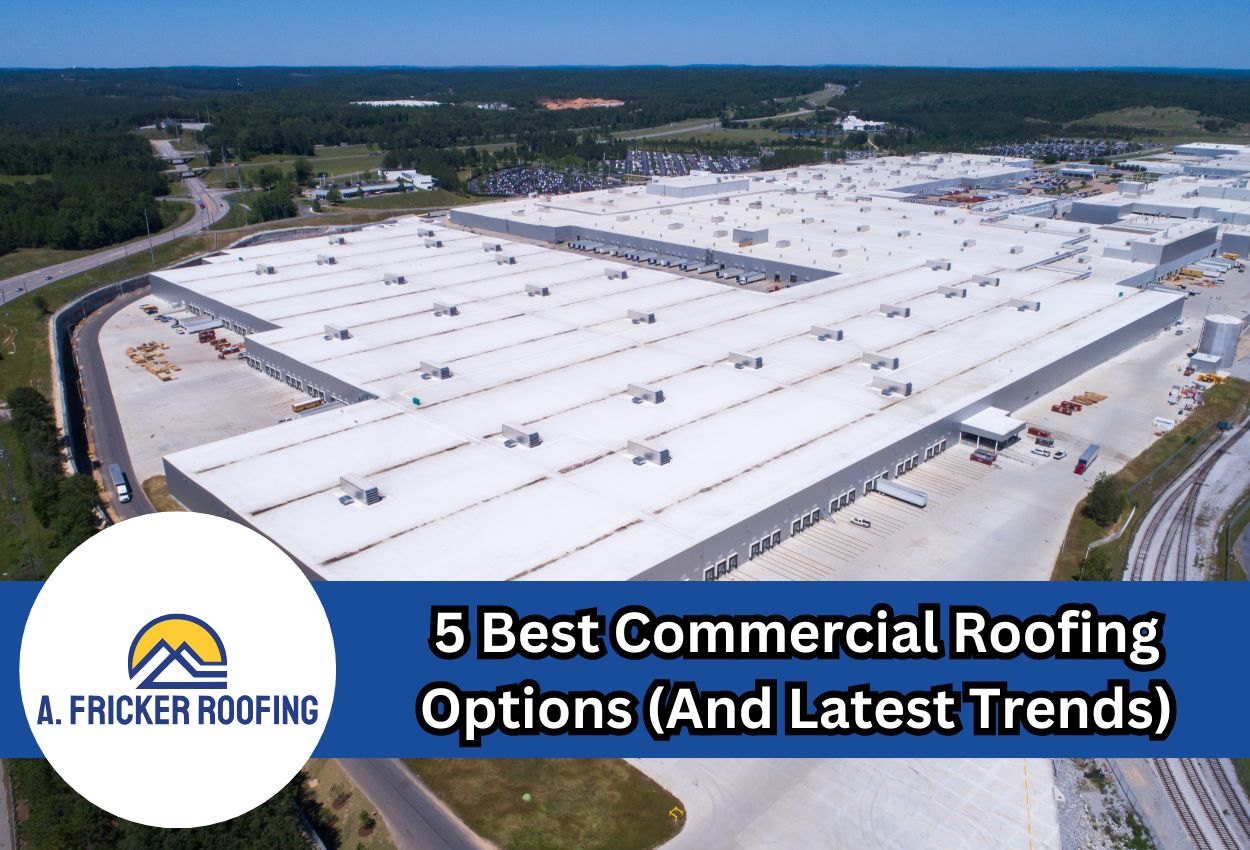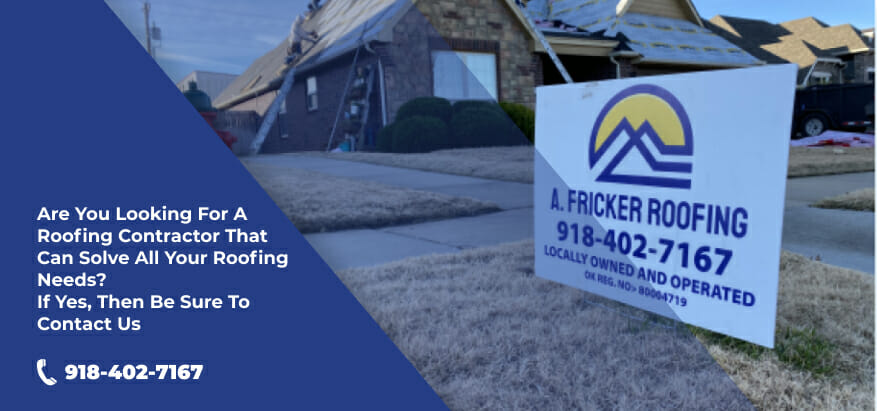If you’re managing a commercial building or own one, chances are you’ve had to think about roofing at some point. Whether you had to patch up a leak or replace an entire roof years ago, it’s not something you think about every day—until something goes wrong.
But here’s the deal: commercial roofing has changed a lot in the last decade or two. If you’re thinking about installing a new roof, the options available today may surprise you. It’s no longer just a choice between asphalt or tar. Materials have evolved, and with that comes better durability, energy efficiency, and cost-effectiveness.
So, if it’s been years since your last roof install, you’ll want to be up to speed on the latest trends and the best options available. To help, in this blog post, we’ll go through the five best commercial roofing options that can help future-proof your building, saving you money in the long run.
Commercial Roofing Products You Should Consider For Your Next Project
TPO (Thermoplastic Polyolefin)
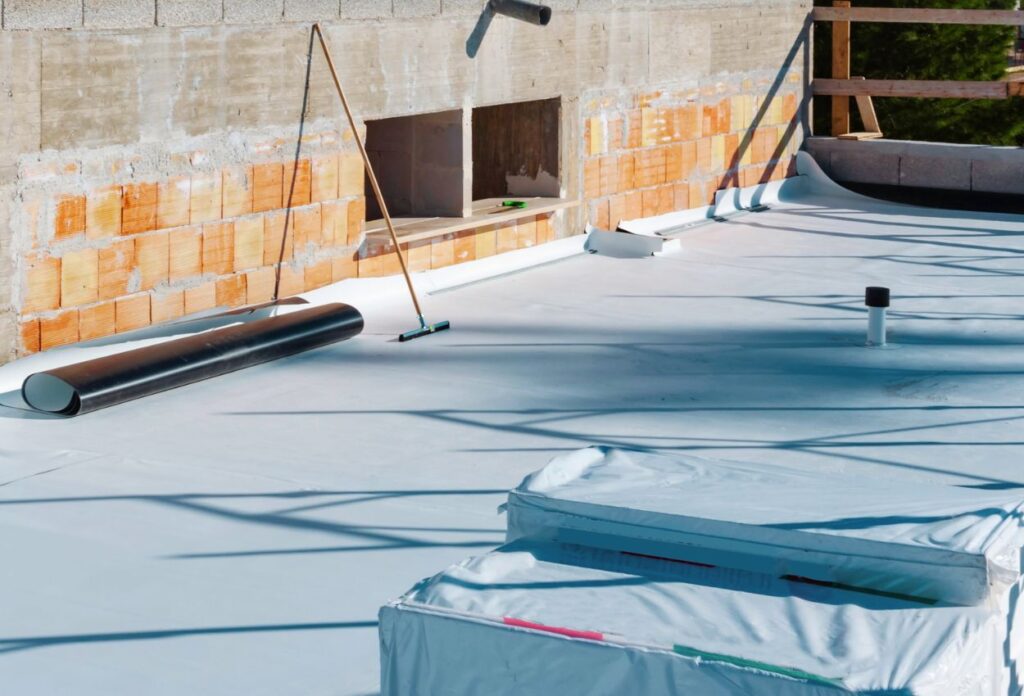
Why it’s great: TPO is one of the most popular roofing materials out there right now, and for good reason. It’s affordable, lightweight, and reflects heat, making it a great option for energy efficiency. A white TPO roof can even help reduce cooling costs by bouncing sunlight away from the building, lowering your energy bills in the process.
What’s new: The big trend with TPO lately is in sustainability. Many manufacturers are producing TPO using recycled materials, which means that not only is it great for reducing energy consumption, but it’s also an eco-friendly choice. Building owners and managers are increasingly leaning toward materials that reduce environmental impact, and TPO fits the bill perfectly.
Another thing to note? TPO’s durability has improved significantly. It’s more resistant to punctures and UV damage than ever before, which is great news for those looking for a long-lasting option.
EPDM (Ethylene Propylene Diene Monomer)
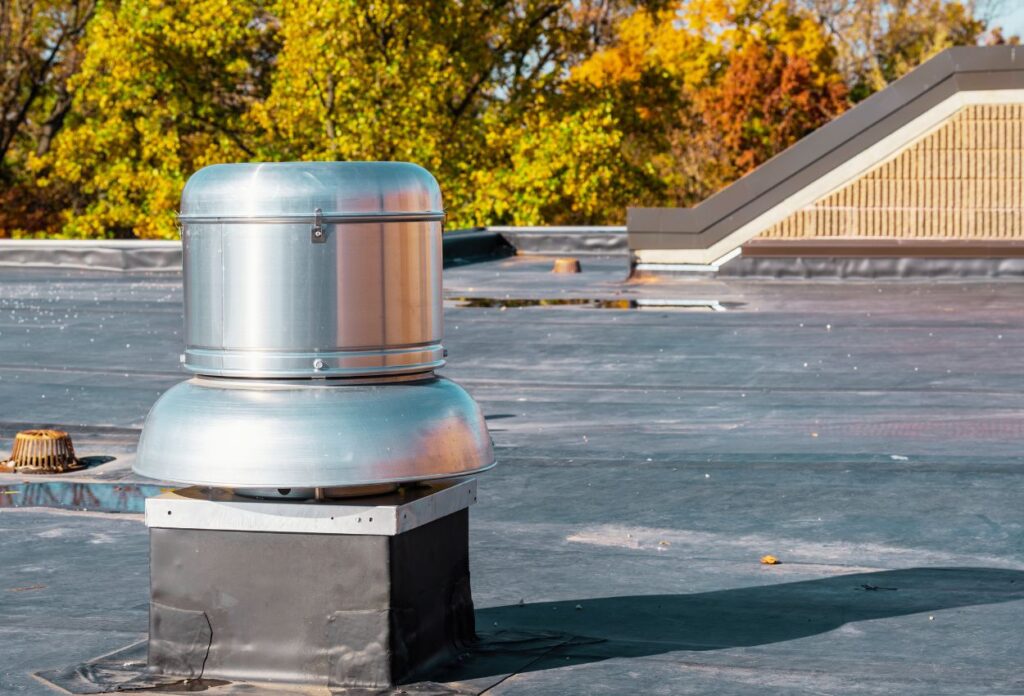
Why it’s great: EPDM is the roofing material that’s been around for a while now, and it’s still one of the top options. Known for its flexibility and resistance to extreme weather conditions, EPDM is a durable choice that can last up to around 30 years or more when properly maintained. It’s usually black, but you can also get it in a white version for added energy efficiency.
What’s new: While EPDM has been a commercial roofing staple for a while, there has been a new version in use. For example, other than the traditional black-colored material, white EPDM is now being used more frequently. This also makes your roof more reflective and energy efficient.
What’s also changing is how the material is being used in combination with other materials. Many building managers are now opting for hybrid roofing systems that combine EPDM with another material in order to cover diverse needs.
Another positive trend in EPDM roofing membranes is that they now contain more recycled materials. Several EPDM manufacturers use more than 20-30% recycled materials.
Also Read: EPDM Roofing Accessories: Essential Components for a Complete System
PVC (Polyvinyl Chloride)
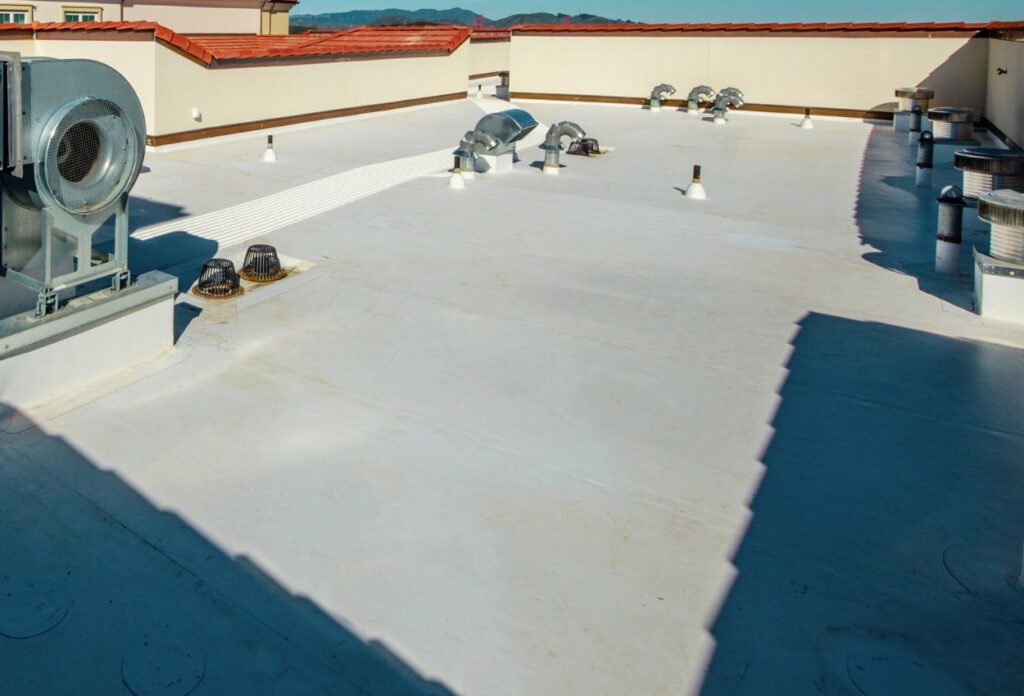
Why it’s great: PVC is known for being tough and long-lasting, especially in environments with chemical exposure. If your building is in an industrial zone or handles chemicals, PVC is a smart choice because it’s resistant to things like oils and greases. It also has strong fire-resistant properties, adding an extra layer of safety.
What’s new: The trend worth noting here is how PVC is becoming more common in cool roofing systems. These systems are specifically designed to reflect heat, similar to TPO, but with the added benefit of increased fire resistance, which could be a deciding factor for some building owners.
PVC roofing has also been evolving in terms of its appearance. You can now get PVC roofs in a variety of colors, making it easier to match your building’s appearance without compromising on performance.
Metal
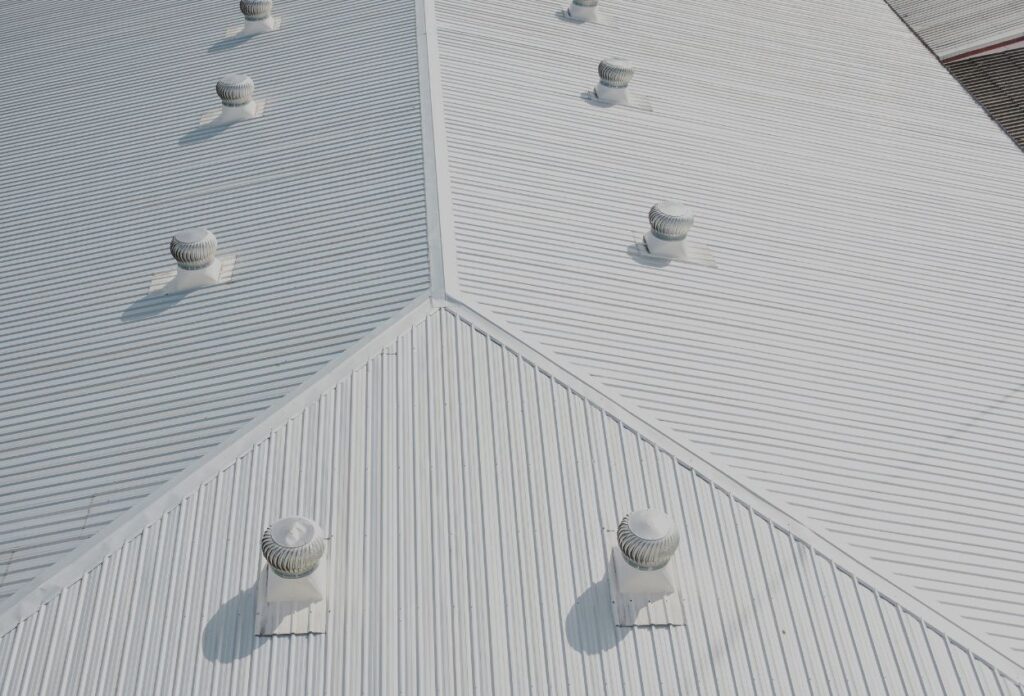
Why it’s great: Metal roofing systems have always been a popular choice for commercial buildings, especially for those that require a sturdy, long-lasting solution. It’s incredibly durable and can last around 40 to 70 years with minimal maintenance. Metal roofs also have excellent wind resistance, making them ideal for buildings in storm-prone areas.
What’s new: Metal roofs are known for being energy efficient. However, over the years, these roofs have become more durable and UV resistant. Many metal roofs are now coated with special reflective paints that bounce heat away from the building, helping to reduce cooling costs. These coatings also increase the roof’s lifespan by protecting it from rust and weather-related damage.
Another growing trend is the use of solar panel integration. Metal roofs are particularly good for installing solar panels, which can provide significant energy savings over time. With more building owners turning to renewable energy solutions, metal roofs with solar capability are a forward-thinking investment.
Also Read: Your Guide To Metal Roof Maintenance In 2024
Modified Bitumen
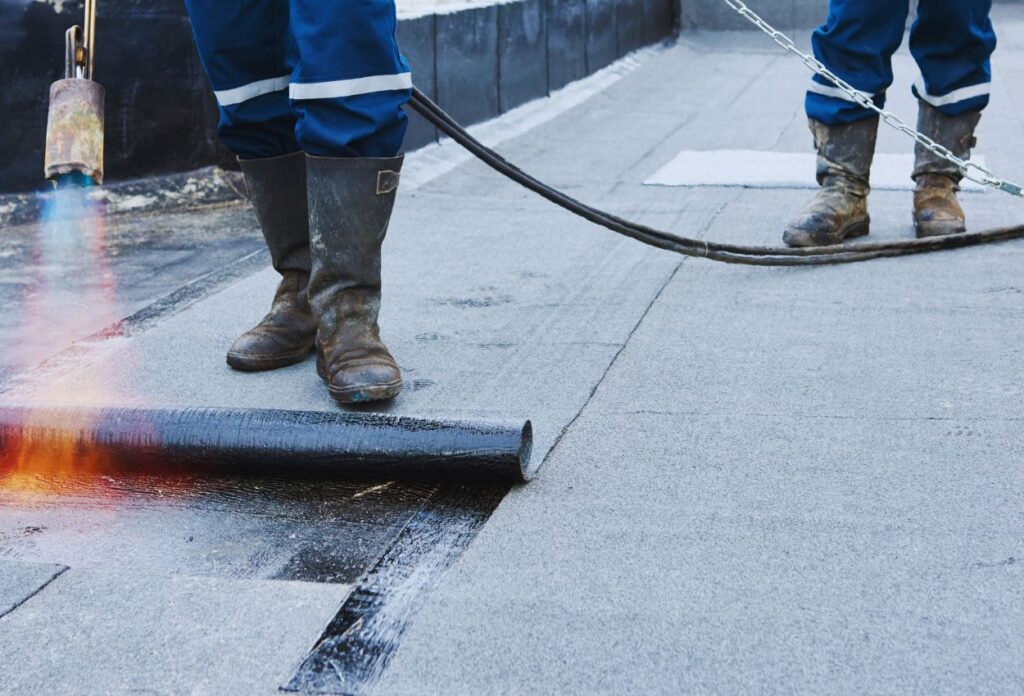
Why it’s great: Modified bitumen is essentially an improved version of asphalt roofing for flat roofs. It’s composed of multiple layers of reinforced materials, making it tougher and more flexible than traditional asphalt. Its durability and relatively low cost, which is why it’s a popular choice for commercial roofs. It’s also known for being easier to repair, which is a big plus for property managers dealing with occasional damage or wear and tear.
What’s new: One of the notable developments in modified bitumen roofing is the variety of application methods now available. Traditionally installed using the hot-mop technique, modified bitumen can also be applied using a torch-down method, cold adhesives, or self-adhesive sheets.
Additionally, the multi-layer system that develops throughout installation offers enhanced durability and waterproofing, making it an excellent choice for roofs that need extra protection from the elements.
Innovations Made In Commercial Roofing Services
Beyond just materials, there are some broader trends in commercial roofing you should be aware of. These trends reflect the direction the industry is heading and can give you a better idea of what to expect in the future:
Green Roofing
Green roofs, also known as vegetative roofs or living roofs, are becoming increasingly popular in urban areas. These systems involve planting vegetation over a waterproof membrane, turning your roof into a living, breathing part of the ecosystem. These roofing systems offer several benefits, including improved insulation, reduced stormwater runoff, and a more pleasant environment for building occupants. Not to mention, it can significantly lower a building’s carbon footprint.
While initially more expensive to install, green roofs can extend the lifespan of your roof by protecting the underlying materials from weather damage. They also contribute to energy savings, especially in terms of cooling costs during hot months. For building owners looking to get a LEED certification or other environmental credentials, green roofing is an excellent investment.
Drone Roof Inspections
One of the most innovative trends in the commercial roofing space is the use of drone technology for inspections. Drone roof inspections are becoming the go-to method for surveying large or hard-to-reach areas, providing high-resolution images and thermal data without the need for scaffolding or manual inspections. This technology can detect issues like leaks, punctures, and heat loss quickly and safely, all while cutting down on inspection time and labor costs.
With drones, roofing contractors can identify potential problems before they escalate, allowing for proactive maintenance. For building owners, this means fewer surprises and lower long-term repair costs.
Liquid Roofing (Roof Coatings)
Liquid roofing is a versatile and cost-effective solution for commercial buildings. These systems, also known as fluid-applied roofs, involve applying a liquid coating (usually an elastomeric coating) that cures to form a seamless, waterproof layer across the entire roof.
The appeal of liquid roofing lies in its flexibility and ease of application. It can be applied quickly, with minimal disruption to building operations, and it creates a fully adhered, seamless membrane that prevents leaks and resists ponding water. This makes it especially useful for roofs with complex designs, penetrations, or areas that are prone to water pooling.
.
Where Is The Market Going?
Thanks to all these new commercial roofing options and some exciting trends in the industry, the roofing industry is seeing quite a boom.
In fact, the global commercial roofing market was valued at approximately $12 billion in 2023. The trend is expected to continue as more and more businesses are up and coming. The industry is expected to grow at about 7% compound annual growth rate (CAGR), reaching around $18 billion in the coming 5 years. This robust expansion is fueled by a number of factors including advancements in materials, increased demand for energy-efficient solutions, and government infrastructure investments
Whether it’s through government incentives for solar installation or city-wide demand for green roofs, the future looks promising for both roofing contractors and property managers.
Your Commercial Roofing Experts In Tulsa
Are you impressed with these commercial roofing options and want help with your roof? Look no further than our team at A. Fricker Roofing and Waterproofing, we offer expert roofing services for businesses throughout Tulsa, OK. With decades of experience, our team is known for providing customized solutions tailored to meet the unique needs of each client. Whether you’re considering a new roof installation or looking to upgrade your current system, we ensure high-quality workmanship and lasting durability. Contact us today at (918) 402-7167 to speak with a roofing professional and schedule your consultation. Let’s protect your building with the best roofing solutions available.
